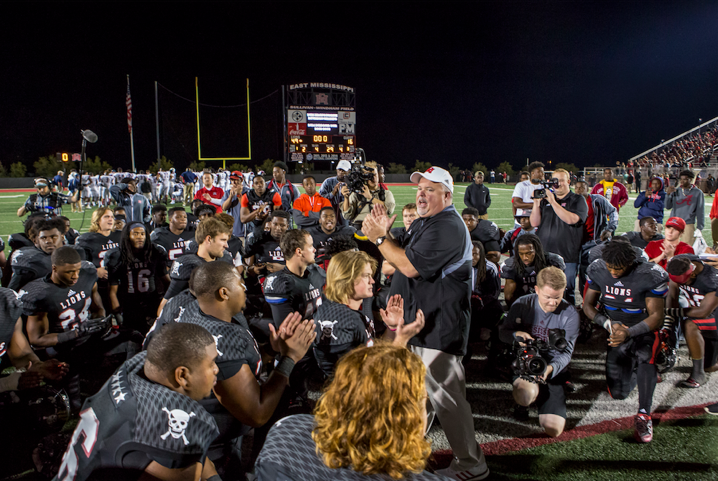Netflix has an amazing ability to find successful properties
and vary them just enough to create their version of a known hit. And I don’t
mean that derogatorily at all. It’s what’s put them on the map in that they can
take elements of the “HBO drama” and the “SyFy drama” and so on and so on. They
can be not just one network, but bits and pieces of all the networks. “Friday Night
Lights” may have never aired as a docu-series on a network, but it started life
as a non-fiction book (a masterful one by Buzz Bissinger) and was then adapted
into a beloved drama on NBC. It’s not a stretch to say that Netflix’s new
docu-series “Last Chance U” is their variation on “FNL” in the way it captures
a part of the country in which football isn’t just a sport or a hobby or
something people watch—it’s a religion. It’s a way of life. And the Church of
the Pigskin captured in Netflix’s series is a fascinating one. It’s a place in which
kids who have burned out at other schools or simply never fit in anywhere else
come to figure out what’s next for them. Do they still have a future in
football? It turns out that many of them do, and those futures come after a lot
of winning in a place where nothing is more important than the touchdown.
Greg Whiteley (“Mitt”) adopts a very observational style
with “Last Chance U,” clearly gravitating to certain arcs/stories that come
about organically in the time he spends at East Mississippi Community College.
In Scooba, MS (pop. 712), the EMCC Lions are Gods. They have won three of the
last four championships at their level, going for a fifth when the show/season
begins. In fact, they’re coming off a 24-game winning streak, decimating
opponents to such a brutal degree that their coach has often been accused of
cruelly running up the score. The Rex Ryan-esque Buddy Stephens is not the kind of guy who cares
about how the opponent feels when they lose by 85. His only focus is to win,
and if you have to crush to win, so be it.
Stephens is a fascinating-enough
character, but Whiteley and his team don’t just concentrate on the coaching
staff, they spend even more time with the student-players, a balance that’s more delicate here than at other schools. A lot
of the EMCC players were once courted by or even at high-profile schools but
couldn’t handle the academic or behavioral requirements, and so essentially
dropped down to “Last Chance U.” So, if they don’t get the grades this time, or
they get caught violating rules, they’re out of chances. We meet a fascinating
counselor/mentor who helps guide the students away from their own demons. A
single mother, she’s the kind of person who talks about how she never
envisioned being at this place or this job but that she’s always tried to be
someone who merely wants to be where they can do the most good. And she’s doing
that. I’d watch a whole series about her.
But then I’d miss Ronald Ollie, a larger-than-life defensive
tackle who clearly has the potential for greatness. That’s the dramatic heft of
the people we meet in “Last Chance U.” Football fans can instantly see the
potential in a player like Ollie or RB DJ Law, but will they keep their act
together long enough and concentrate hard enough on their sport for that talent to matter? Most people who play football, on any level, don’t end up doing it
for a living. How do you balance the game that you’ve played and loved since a
child with the obligation to become an adult? That’s the question that hums through
“Last Chance U,” and the show is cleverly structured in the way that it devotes
the final act of at least the two episodes I’ve seen to that week’s game.
Having not seen the final four, I feel a bit disadvantaged
as to the quality of the series overall, and I’m curious to see how Whiteley and his team continue to develop “story” by focusing on certain arcs. The fact is this football fan was engaged by the two I’ve seen,
and I’m ready to take the trip down to Scooba, MS again this Friday.












